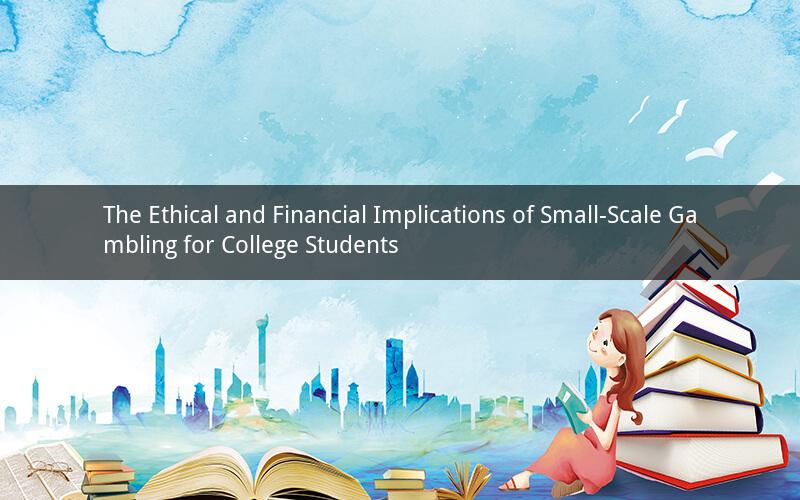
In recent years, the prevalence of gambling among college students has been a topic of considerable debate. Some argue that engaging in small amounts of gambling can be a fun and harmless way to unwind, while others believe it can lead to addiction and financial problems. This article explores the ethical and financial implications of small-scale gambling for college students, examining both perspectives and providing a comprehensive analysis of the issue.
1. Ethical Implications
The ethical implications of gambling among college students are multifaceted. On one hand, some argue that gambling can be a form of entertainment that helps students relax and relieve stress. In this sense, it can be seen as a recreational activity akin to watching a movie or playing video games. However, others argue that gambling can be harmful, especially when it becomes a means of escaping reality or dealing with personal issues.
One ethical concern is the potential for gambling to become addictive. College students may be more susceptible to addiction due to factors such as stress, peer pressure, and the availability of gambling opportunities. When gambling becomes an escape from problems, it can lead to negative consequences, such as neglecting academic responsibilities and developing financial problems.
Another ethical concern is the potential for gambling to be deceptive. Many gambling activities involve an element of chance, which can lead to feelings of frustration and disappointment. In some cases, students may feel they have been taken advantage of by casinos or online gambling platforms.
2. Financial Implications
The financial implications of gambling among college students are also significant. While small-scale gambling may seem harmless, it can quickly become a financial burden. Here are some of the key financial implications:
a. Loss of money: Even when gambling in small amounts, college students can still lose money. This can lead to financial stress and anxiety, which can further exacerbate ethical concerns.
b. Debt: If a student becomes addicted to gambling, they may start to borrow money to fund their habit. This can lead to significant debt, which can have long-term consequences for their financial well-being.
c. Impact on education: If a student spends a significant amount of time and money on gambling, it can negatively impact their academic performance. This can lead to lower grades, which can have long-term consequences for their career prospects.
3. The Role of Education
One way to address the ethical and financial implications of gambling among college students is through education. Colleges and universities should provide students with information about the risks of gambling and the importance of responsible gambling. This can help students make informed decisions about whether or not to engage in gambling activities.
Additionally, colleges should offer support services for students who may be struggling with gambling addiction. This can include counseling, support groups, and financial literacy programs. By providing these resources, colleges can help students navigate the complexities of gambling and make responsible choices.
4. The Role of Parents and Guardians
Parents and guardians also play a crucial role in addressing the ethical and financial implications of gambling among college students. They should be aware of the risks associated with gambling and encourage their children to make informed decisions. Parents can also provide financial support and guidance to help their children manage their finances responsibly.
5. The Role of Policy
Governments and regulatory bodies should also play a role in addressing the ethical and financial implications of gambling among college students. This can include implementing stricter regulations on gambling activities, providing funding for education and support services, and promoting responsible gambling practices.
In conclusion, the ethical and financial implications of small-scale gambling among college students are significant. While some may argue that gambling can be a fun and harmless way to unwind, the potential for addiction, debt, and negative consequences cannot be ignored. By providing education, support services, and responsible gambling practices, we can help college students make informed decisions and mitigate the risks associated with gambling.
Questions and Answers:
1. Q: Can small-scale gambling lead to addiction among college students?
A: Yes, small-scale gambling can lead to addiction among college students, especially if they are susceptible to addiction due to factors such as stress, peer pressure, and the availability of gambling opportunities.
2. Q: How can colleges and universities help students make informed decisions about gambling?
A: Colleges and universities can help students make informed decisions about gambling by providing education about the risks of gambling, offering support services for those struggling with addiction, and promoting responsible gambling practices.
3. Q: What are some of the financial implications of gambling for college students?
A: The financial implications of gambling for college students include the potential for loss of money, debt, and negative impact on education, which can have long-term consequences for their financial well-being and career prospects.
4. Q: How can parents and guardians help their children manage their finances responsibly?
A: Parents and guardians can help their children manage their finances responsibly by being aware of the risks associated with gambling, encouraging informed decision-making, and providing financial support and guidance.
5. Q: What role should governments and regulatory bodies play in addressing the ethical and financial implications of gambling among college students?
A: Governments and regulatory bodies should implement stricter regulations on gambling activities, provide funding for education and support services, and promote responsible gambling practices to help mitigate the risks associated with gambling among college students.